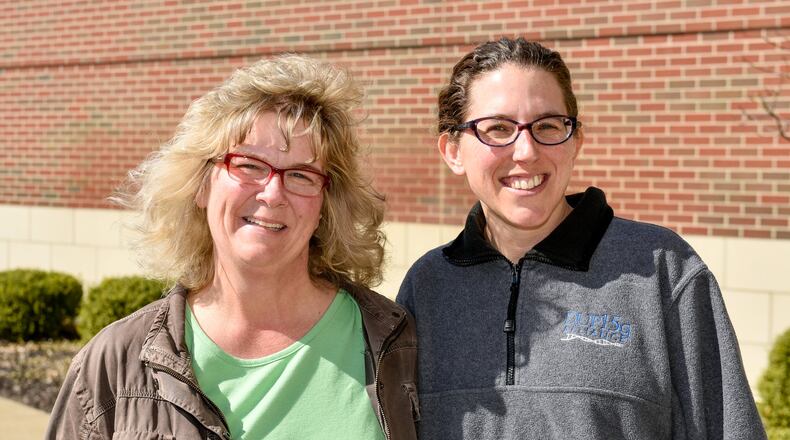Rare Disease Day takes place on the last day of February each year. The main objective is to raise awareness with the general public and decision-makers about rare diseases and their impact on patients’ lives.
For Jennifer Kelly of Mason, and Jill Baker of Hamilton, that day last week — leading up to which they met — is just one of 365 for them in terms of learning about the disease and trying to bring awareness to people about its impact.
MORE: At sheriff’s urging, Hamilton residents lobby school board for armed teachers
Baker said her daughter Riley, who is now, 11, was very young when she was diagnosed with the disease.
“When Riley was 6 months old, she was diagnosed with a very rare type of seizure, Infantile Spasms, and this led to genetic testing which revealed the idic15 (one cause of a chromosome disorder she has),” Baker said. “A few years later, she was also diagnosed with Autism, which is not uncommon in children with dup15q (another factor with the chromosome affliction.”
Baker is a physical therapist with the Hamilton School District, and Riley has been doing well in the school district, but the challenges facing the family, husband Richie and 22-year-old son, Jared, have been daunting.
MORE: What’s happening with Hamilton superintendent Tony Orr, who remains on leave?
“There are so many varying degrees of how children suffering from this perform cognitively, and Riley is on the lower end,” she explained. “She has room to grow and we were fortunate to have an early diagnosis. My son Jared was only 12 and he felt guilty after Riley was diagnosed.”
Baker added that Jared found her crying in the basement one day and offered that it “was his fault” that his sister was afflicted with Dup15q Syndrome.
“He told me that because he had been asking us for a sibling that it was his fault this happened,” Baker said. “I told him, ‘Honey it’s not your fault. This just happened.’”
For Kelly, a stay-at-home mom, her daughter Caitlin was diagnosed at 7 months old. The revelation was a double dose of pain for her and her husband Steve, who had just lost a daughter, Cecelia, who was stillborn.
“There was just so much of me that was gone with the loss of my daughter and then to receive the diagnosis,” Kelly said, as her voice trailed off, while her 3-year-old son Patrick played alongside her. “I was really helped by Atrium Medical Center’s HEAL program which helps families deal with the death of a child.”
Kelly noted that there are only 1,300 kids that have been diagnosed with Dup15q Syndrome in the world and that when she noticed the spasms and “floppy baby” symptoms Caitlin was going through she took action.
From the family’s pediatrician to a neurologist to geneticist, the trail led to a confirmed diagnosis from Cincinnati Children’s Hospital.
“Some people wait years to get a diagnosis,’ Kelly said. “It is hard to get a referral for genetic testing because nobody wants to foot the bill.”
She added that Caitlin looks as though she is a regularly functioning child physically which makes it at times harder to deal with the disease.
“She looks like any other 8 or 9-year-old,” Kelly said. “But if you have her in line at Kings Island and she gets the impulse that she can’t control like talking over people or reaching into their bags it can be frustrating.”
Caitlin did perform with a cheerleading squad at her school as part of a program designed to reach out to those with disabilities.
Those moments are few and far between for both women who often wonder what would happen to their children if they were not around to care for them.
“We set up a trust and changed our wills to at least have some long-term care for Caitlin,” Kelly said.
Baker said it is tough to think about what living conditions Riley would have in the world if family was not around.
But today, they want people to be aware that there is hope and and information available for those suffering from rare diseases.
“Find support early and it is out there,” Baker said. “Dup15q Syndrome Alliance Group had over 1,000 families.”
Kelly and Baker connected online, and their meeting last Tuesday was the first time they have met face-to-face. Both of them will be traveling with 28 other mothers in July to Florida for a trip to discuss the disease and what impact it has had on their families.
“It will be good to share everything and to laugh or cry,” Kelly said. “It is good that we (Baker) get to go together.”
About the Author
